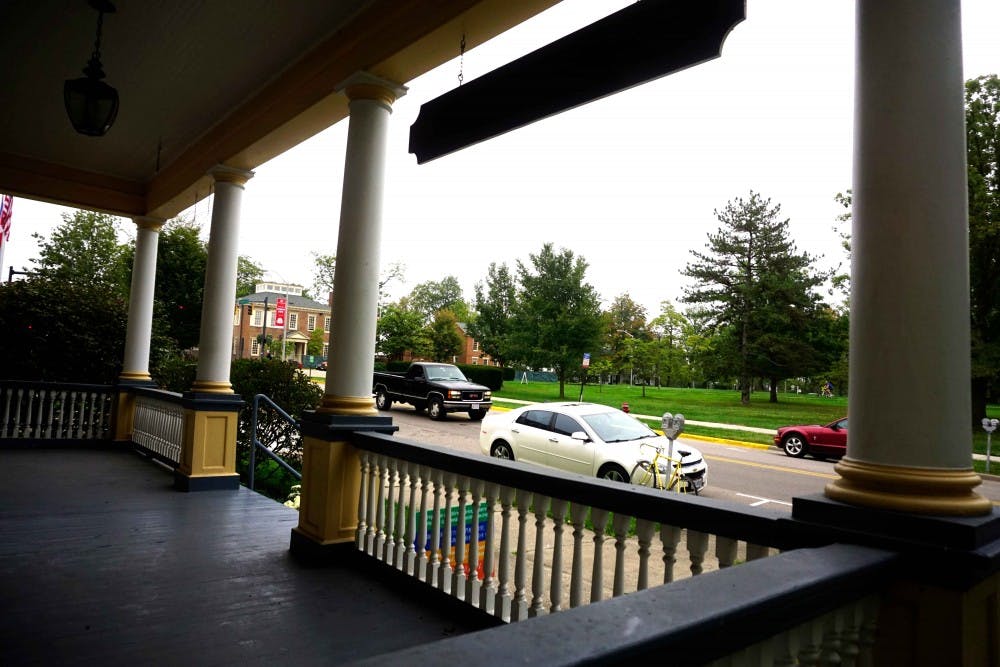The room resembles most other university common areas. Bean bag chairs and futons with throw pillows rest on the wooden floor. Flyers advertising on-campus events hang from the walls. Autumn decorations adorn the cozy brick fireplace. Baskets of snacks and school supplies are available on various tables and desks.
On a central table lies a stack of small leaflets. At the top of each, above an illustration of crushed red party cups, reads the question, "Have You Had 1 Too Many 1 Too Many Times?"
This is The Haven at College, Miami's new outpatient center for students struggling with addiction or alcohol abuse. Located on the second floor of the Interfaith Center at 16 S. Campus, The Haven offers a variety of recovery programs and outpatient services, including individual counseling, group therapy and student-led recovery programs.
However, the space also functions as a safe, inclusive spot where any students can gather to study or relax.
"It's a safe place, a haven, where they can come and hang out and live a college life," said Janae Arno, a student care manager at The Haven at Miami.
The Haven is a national organization aimed at creating a safe and supportive recovery community for college students. It currently operates at five universities and was approached by Miami last October after the treatment and recovery work group of Miami's Alcohol Coordinating Committee determined the university needed to offer better recovery services on campus.
The Haven began by conducting a community mapping of Oxford and Miami. Representatives from the organization came to campus for a week to talk with students, faculty and community members to get a sense of the drinking culture, the drug culture and the recovery culture.
One finding of the community mapping report was that substance misuse is "major issue at Miami University with a pervasive, highly visible and deeply ingrained drinking culture in which some administrators recommend students leave Miami or do not apply/matriculate if their lifestyle is not in alignment with this culture."
"They're not addressing it before they're getting in trouble and going to OESCR, or they're failing out of school or not feeling like they can abstain from drinking and stay at Miami," east coast director of The Haven, Aly Reis, said. "We heard a lot about the Miami party scene and how that's a big part of the culture and how if a student doesn't partake in that, sometimes they will feel out of place."
Coordinator of Substance Abuse Treatment with Miami's Student Counseling Services, Dr. Ritch Hall, helped bring The Haven to Miami. In addition to the stellar reviews and recommendations the program received from the other universities where it operates, Dr. Hall was drawn to The Haven's student-led approach, which he views as fundamental to reducing the prevalent stigma surrounding substance abuse.
"The drinking culture is not stigmatized," Hall said. "It's more stigmatized for a student to not be a drinker on this campus than for a student to be a drinker. That has to be broken down and in order to do that, it's gotta come from the students up. We can't do it from the top down."
Ph.D. student JP Gonzales encountered this stigma when he arrived at Miami two years ago. Gonzales, who is eight years into recovery, did not feel pressured to drink, but he did struggle to escape the prevalence of alcohol consumption on campus.
Enjoy what you're reading?
Signup for our newsletter
"It's challenging," Gonzales said. "I don't go to parties or anything, but the culture is kind of everywhere you go. It's hard to avoid. It's hard to find friends who want to spend time and not drink."
Gonzales is one of the main student volunteers at The Haven, helping to operate the space while leading recovery support groups two nights a week. He also is working to develop sober weekend programming which will act as an alternative for students who don't wish to go to the bars Uptown on Fridays and Saturdays.
The Haven differs from other recovery organizations, such as Alcoholics Anonymous, in that it does not require students to self-identify in order to attend. You don't have to admit you're an alcoholic or an addict; you don't even have to have a problem. Anyone is allowed to come hang out.
Sherrie Kleinholz, a clinical director at The Haven, believes that in such a stigmatized environment, this sort of inclusivity will hopefully encourage students who are curious to come check out what the facility has to offer. Though The Haven has only been open for about a month, Kleinholz said they have already seen students coming around to talk and hang out.
"They're very curious," Kleinholz said. "They want to come, but they still feel that stigma, that nervousness. So they want to test the waters. Our students that work here are very good at making them feel comfortable."
One of those students is sophomore Nick White. Though not in recovery himself, White fell in love with The Haven's mission and signed up to volunteer. Having worked at Brick Street last semester, he said he's seen the horrible effects alcohol can have on people.
"I've seen the ugly face of problems with alcohol being at Miami for a year and a half," White said. "I've seen people get kicked out of school, get suspended, being in their worst condition... I've seen the ugly side of things."
White understands how alienating it can feel to struggle with alcohol abuse or addiction on Miami's campus. He encourages anyone who thinks they might have a problem to stop by The Haven and hang out.
"You're not alone," White said. "There are so many more people than you think. It's an invisible community for the most part... There are so many people out there who have conquered it and want to help you conquer it. It's not something to be embarrassed about."
shumandb@miamioh.edu




